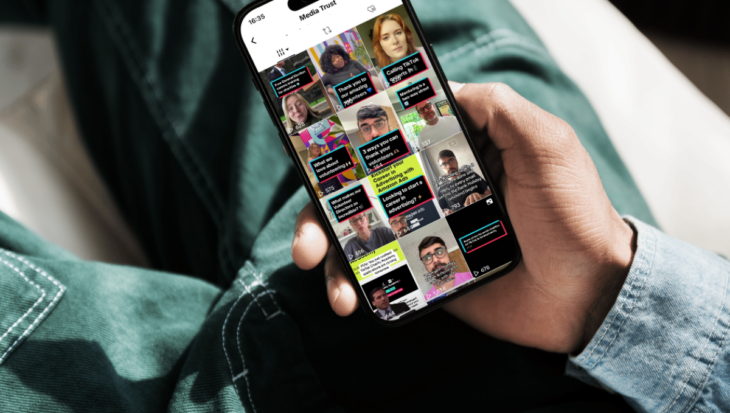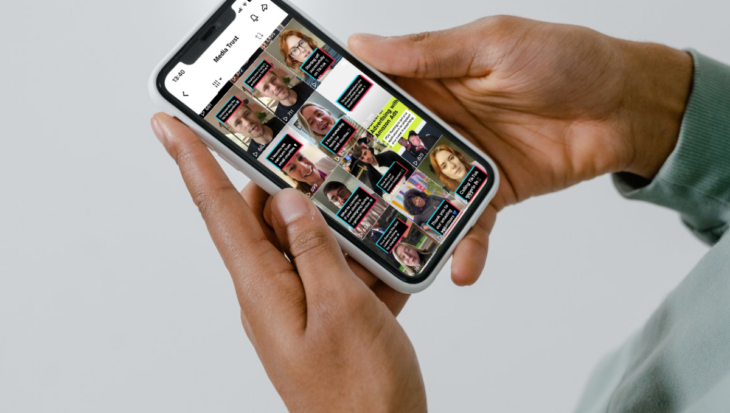Almost 30 years of working with small charities has taught us that bigger isn’t always better. From resilience to flexibility and innovation, small charities are experts in doing a lot with a little. This is no coincidence: with overstretched budgets and understaffed teams, small charity comms professionals know how to come up with powerful and innovative ways to cut through the noise and shout louder than their size.
Whether you’re in the charity sector or not, there are valuable lessons we can all learn from how small charities communicate their messages
1. Be crystal clear about your reason to exist
Small charities are often set up in response to a very specific need. Personal experience might inspire someone to fill a gap in care or support and provide new access to services. This clarity of focus means small charities know how to communicate their reason for existence in simple terms. They have a precise remit and can articulate that mission in just a few sentences. Small charity marketers leverage this – they are clear about their mission and the impact support can have. They know that when it comes to cause-based comms there’s no room for doubt – and clarity of purpose can inspire change.
Here’s an example from R;ipple, which provides hope and encouragement to keep people safe at their most vulnerable point.
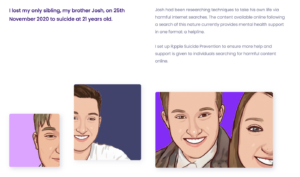
2. Creativity is at the heart of a strong campaign
Small charity campaigns must be creative to cut through the noise. They don’t have big budgets for ad placements and often rely on organic reach to get their message out there. This means their content needs to be scroll-stopping and unexpected! What do you think of when you think of the heritage sector?
History, prestige and creams tea’s come to mind, but perhaps not a lot of humour. So the tongue-in-cheek content from The MERL and the CRAB MUSEUM makes for a great example of small organisations shaking up the heritage sector with levity and a touch of the unexpected. They stand out with a sense of silliness and brand positioning that differs from their competition.
3. Put voices of lived experience at the centre of your messaging
Often charity leaders are experts by experience or work closely with their beneficiaries in a way that allows them to centre the voices of people at the heart of their cause. By amplifying the voices of those directly affected by the issues they aim to address, small charities create a more authentic and impactful narrative. Sharing real stories and perspectives helps humanise the challenges and evokes empathy in their audience. For those in the commercial sector, championing lived experience is about putting your customer at the heart of your brand story. Your customers or clients are the heroes, and your brand needs to earn a place in their life. Embracing the power of lived experience will not only strengthen your messaging but also foster a deeper connection and understanding between your organisation and the people it exists to serve.
Have a look at My Black Dog. Their strapline, “when you don’t know who to talk to, talk to someone who gets it”, sums it up perfectly.

4. Really listen to your audience
Small charities are usually close to their beneficiaries which means they’re perfectly placed to listen to them. They know their challenges, their values and what their community really needs. They know that a whilst a survey can say a lot, real conversations with the people they support can often reveal much more. Listening to the challenges, needs and experiences of your customers will help you improve your service or product, identify new and emerging trends, and set yourself apart as an authentic brand.
Here’s an example from The Survivors Trust, who put listening at the heart of what they do.
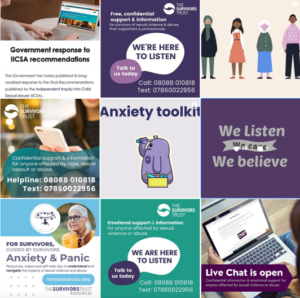
5. Be flexible when things don’t go as planned.
Small charities know that making mistakes is the privilege of being active. They’re not afraid to try new things, experiment and fail to succeed. Embracing failure as a steppingstone to success means you can view setbacks as valuable learning opportunities that fuel innovation. Encourage a culture of experimentation and resilience, so you can discover new approaches and strategies that ultimately lead to greater impact and growth.
6. Choose your channels wisely
Small charities might not always have a lot of time or money, but they know the value of being focused on the comms channels with the highest impact. They take the time to develop a strategy and show up with the right message, on the right platform for the right audience. By streamlining their digital comms to the channels which perform best, they have more time to develop engaging content and nurture their community.
7. Collaboration is essential
One small charity can make a lot of noise, but that’s nothing compared to two or three small charities working together, amplifying each other’s messages, and providing value to each other’s audiences. Whilst collaboration takes time, it’s a sure-fire way to build momentum and get more attention for the issues they’re campaigning on. Seeking partnerships that align at a fundamental level is time well spent. Small charities understand that partnerships must be built on shared goals and values. Your customers and supporters are wise to room green or rainbow-washing – they want collaborations that affect real change.
Need inspiration? Check out Rape Crisis collaboration with End Violence Against Women and Centre for Women’s Justice.
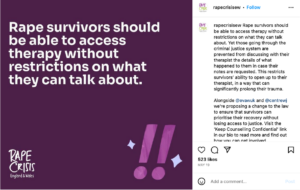
What all of this shows us is that small charities are a true force in society who should never be overlooked. We hope take inspiration from these lessons, whether you work in the charity sector or not!







